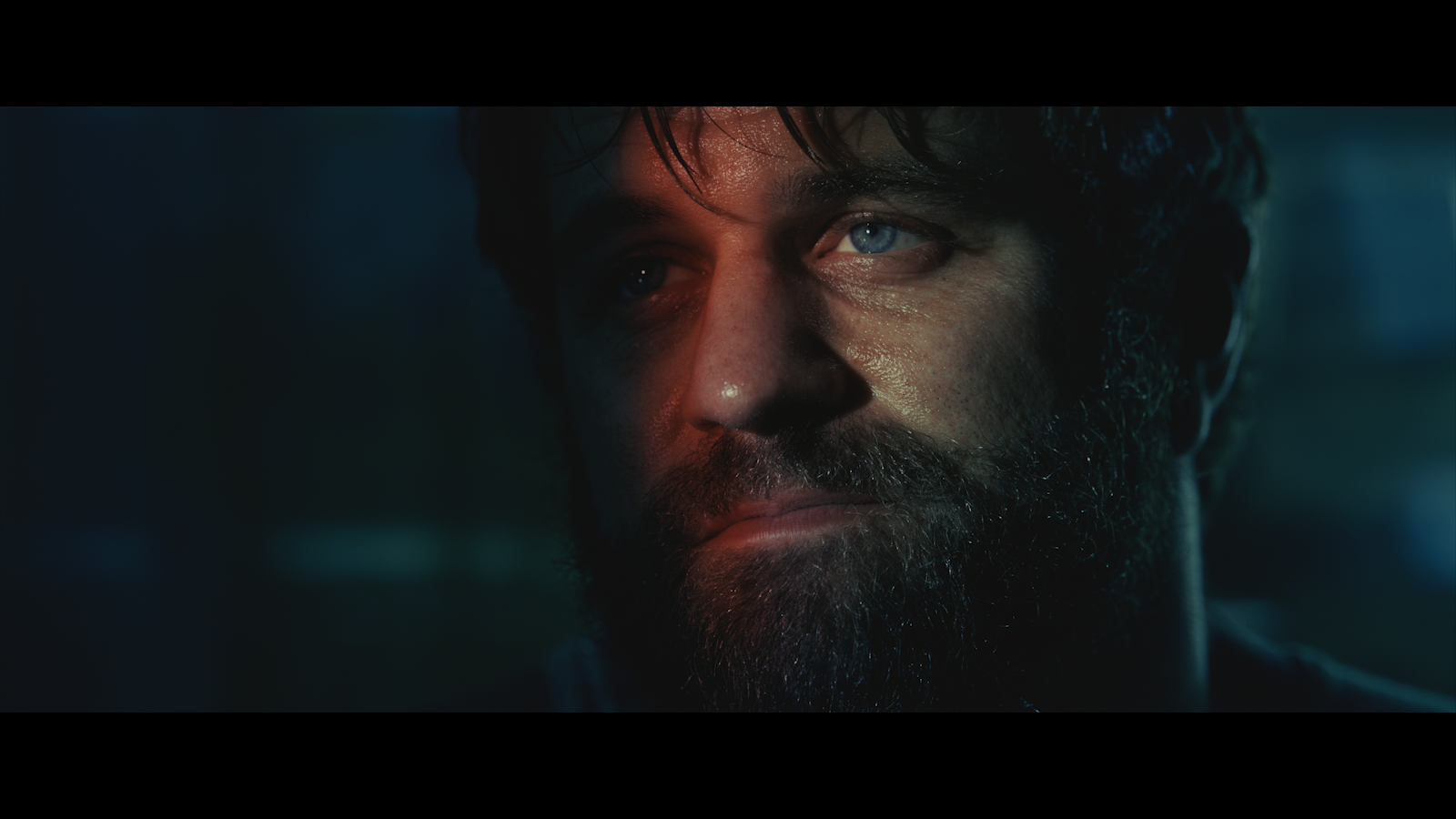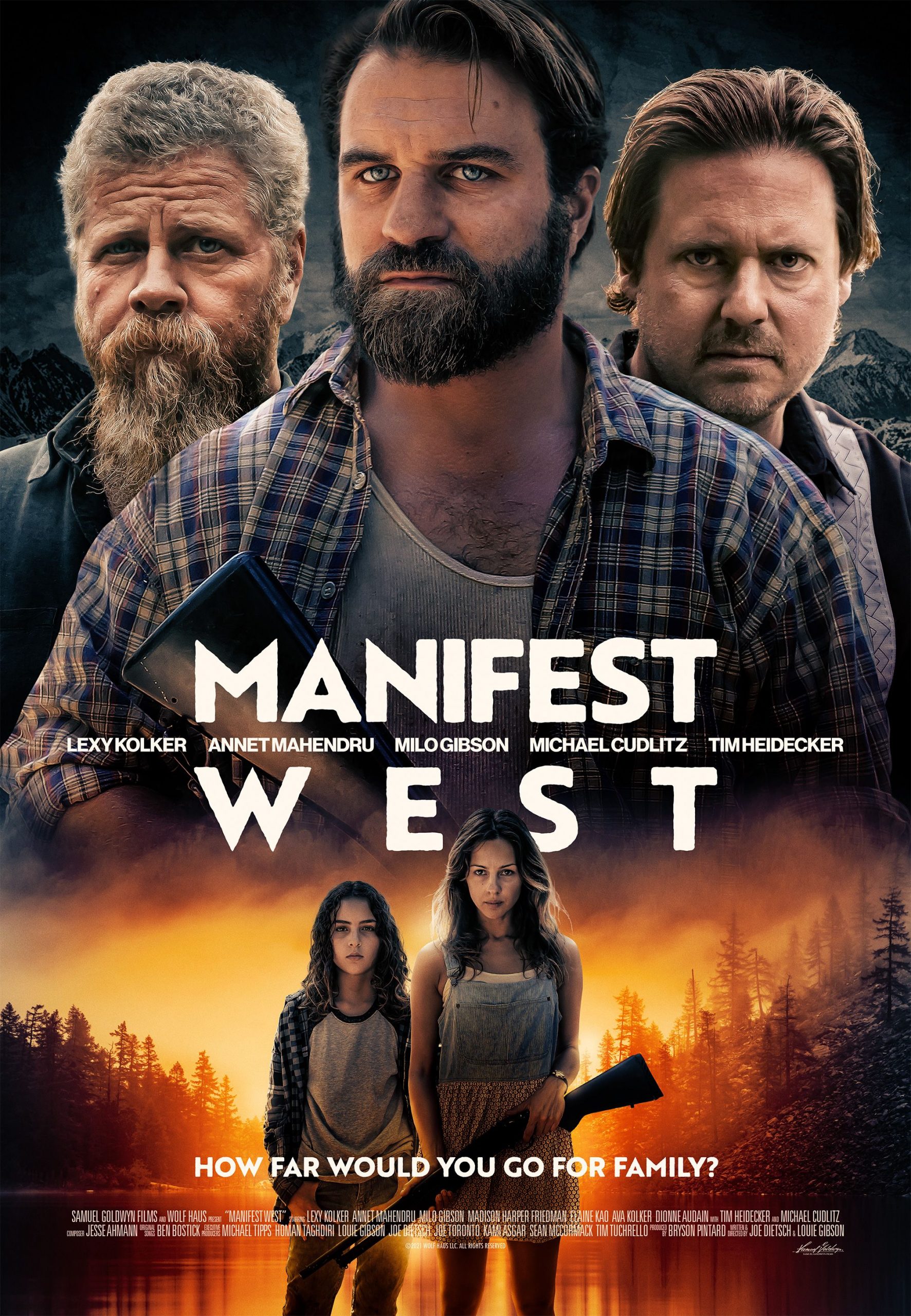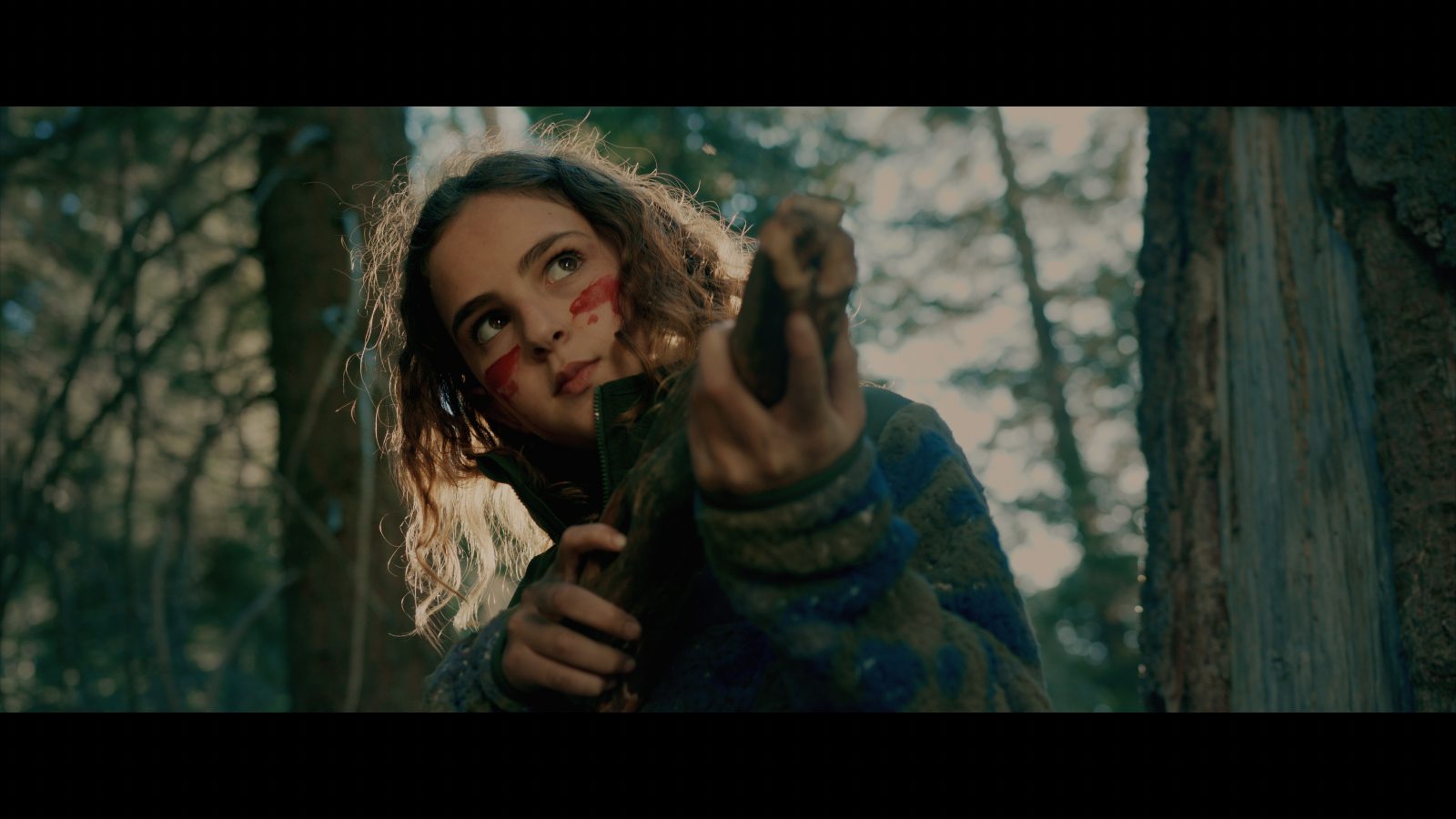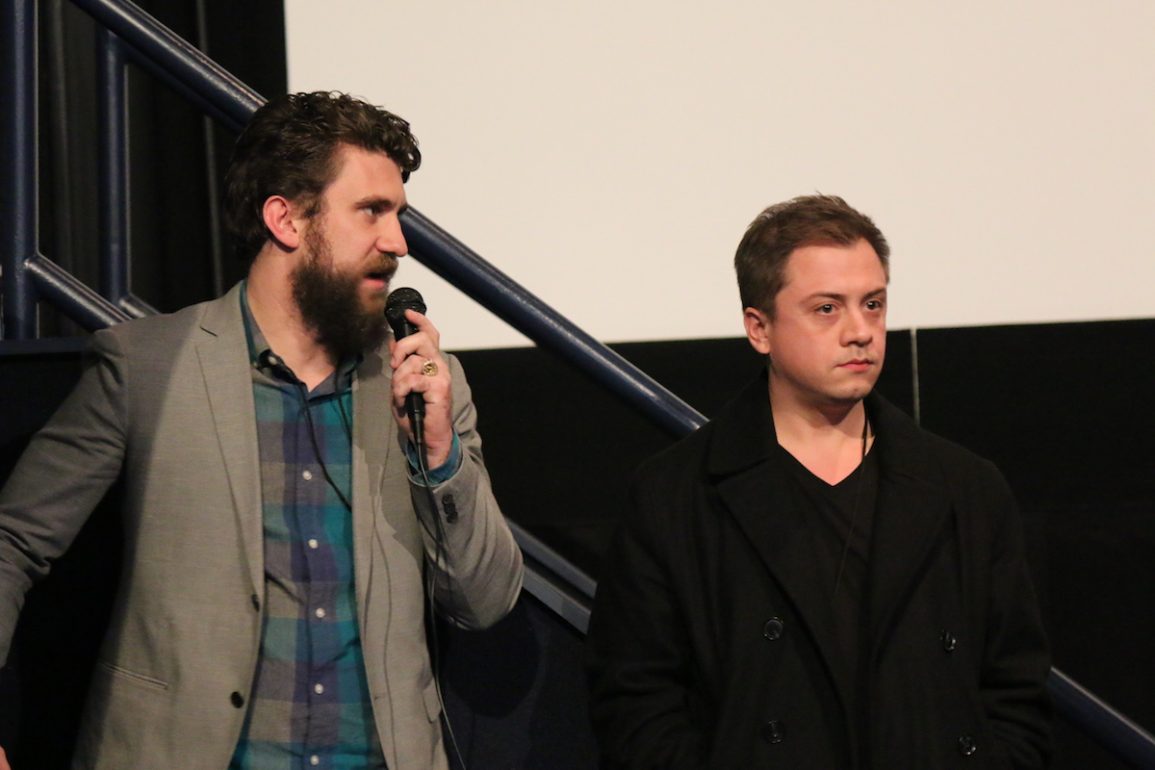MANIFEST WEST is a coming-of-age story, told through the eyes of a ten-year old girl whose family moves off the grid into untamed North American Wilderness. It’s their attempt to establish normalcy, to thrive off the land, and escape the pressures of modern society. But the family has its own internal pressures building, and you can’t escape what’s going on in your own household, no matter how far you move up a mountain.
I spoke with the writers/directors of the film Louie Gibson and Joe Dietsch.
You both worked on the script for Manifest West, which I feel is very much a film for our times. How did it all initially come about?
Joe: We started writing the script in 2019. We had kind of been looking at a lot of these government standoffs that had happened in the United States in the 1990s and it was just an interesting world to us; and to look into these people who are in these situations, not trying to be antagonists. They were trying to just have a life experience that was at odds with society. Then that spiraled into a series of increasingly bad choices that led to these standoffs and looking at those characters and saying, who were those people? And that was an interesting world for us to explore. Then we finished the script and we’re going into production and then COVID happened, which I think then gave a different meaning, I guess, to the film.

Yeah, that’s funny, because I thought you would actually have written it during COVID because it’s so relevant for right now. I think particularly with mental health recently, everybody’s been really struggling. I feel like this film is a study of mental health and particularly bipolar disorder. What kind of research did you have to do into bipolar disorder or mental health in general for the film?
Louie: We had done a lot of reading on it and we had talked to some doctors and talked to some people either with family members or they themselves who have the condition. It was understanding that. Then Annet Mahendru who plays Alice Hayes, who is bipolar in the film, she had done her own research and we worked a lot together. So yeah, it’s a serious topic, so we wanted to make sure that we got it right.
How is the writing process whenever you have two writers?
Joe: Yeah, I think we brainstorm together. We have a lot of similar sensibilities. If you don’t have similar sensibilities, it’s never, never going to work to begin with. But I think we outline it together; we sort of talk about it together. Then you go off and within that outline you write your own scenes and then we swap scenes; and you compile it eventually. But we tend to write mostly separately.
I think with writing comedy together, I think you can sit in the same room and bounce jokes around and that’s a sort of particular experience with writing. But I think that especially with writing drama or something serious, it’s a little personal. It’s odd to bounce a dramatic scene around a room. It’s like it’s that more sensitive place.
Louie: Yeah, we tried that early on, and it just didn’t work. Because you need to be able to sit on something and really think and if you’re kind of feeling vulnerable and second guessing all the time then you’re like “What’s he writing?” It’s like you just want to be able to sit with the scene for a couple of days.
Following on from that, how do you go about sharing directing duties?
Louie: We do so much like pre-production on it and we understand it so well. We talk so much about it. We’re talking every day that by the time we get into it, we have the same vision. It’s about never contradicting the other person in front of someone, which can happen sometimes accidentally. We make a point of not doing that and it seemed to work so far, so good!
Joe: Louie was saying earlier, it’s sort of a “yes and…” process, if you’re familiar with that concept from improv, which is sort of never saying, “no, that’s wrong”. Or “That works but also, let’s try that”. You can be shooting a scene out one day and Louie says, “Hey, can you try this?” I’m never going to be like, “No, don’t do that.” It’s more like “It’s cool, try that. Hey, also, can we try this?” Then you got it both ways and it’s good where you’re building something rather than sort of tearing one person’s thing down and trying something else.
Louie: Yeah, you never break the confidence of the actor and that’s the number one, I think with actors and crews because I’ve seen that happen before, not even with dual director sets, but just in general and it’s like you just lose everybody and you’re fucked so, yeah, we work well together.

I loved the score. I’m a big music score fan and the music really helped in creating a sense of impending doom. How did you go about working with the composer Jesse Ahmann in creating the film’s music?
Louie: We wanted a cello. When we were sitting and cutting the movie, we were talking. We thought it would be really cool just to have cellos in this movie, kind of listening off like Sicario, where they do those big cellos and stuff. We’re like, It doesn’t need to be that intense, but we like the idea of that instrument and the things you can do with it, manipulate it. To be honest, we actually went online. We were trying to pull samples and we wrote in “cello” and one of the first things that popped up on YouTube was by Montana Cellist. That’s his a.k.a. that’s Jesse Ahmann site is Montana Cellist. And he’d have these three-hour cello pieces that would just like loop and go and one of those, at least, I think is the theme of the movie. That’s the one we use because he had done it, but it wasn’t an original piece given us for the movie. So, we started popping those into a cut and then we just said, “Why don’t we just write this guy?” We just wrote and said, “You want to do it?” We jumped on a call and he said, “Let’s do it”. He was awesome. It was just one of those things where it all worked out.
Joe: He scored a bunch of original pieces for the film that were tailored to specific themes. You had a couple of existing suites that we really loved. Can we use that piece here and that piece there and just sort of license them separately.
Louie: But we just met him for the first time in person the other day. I realised we’d never met him before.
Joe: Yeah, it’s very modern post COVID where we had this composer where we never met him aside from online but he was fantastic.
Has the whole post-COVID world changed the way you go about making films or is generally kind of the same?
Joe: Hopefully not too much…
Louie: This was such a small cast and crew and was so contained that it just felt like we were shooting an Indie. I guess we’ll see. It seems like things are lightening up.

Yeah, hopefully. I thought Lexie was an amazing find as Riley, how did you find her and why was she the perfect choice for the role?
Joe: Going into this I think we knew that the lead child actor had to be great. She’s in literally every scene of the movie. She really anchors it and you’re seeing the world through her eyes. That performance just had to land. We’d gone around to casting agents in L.A. and we had Coast to Coast, which is a big agency and they had said Lexi would be perfect for this. We met her and she was and I think we were not going to second guess too much when something feels right. She’s super smart. She’s a great actress and a kid so beyond her years. The ability to communicate and talk about a scene and how to approach just the business of the production. We just felt great about her and moved ahead. You see these stories where they had the casting call for 10,000 kids and this wasn’t that but it was still this sort of organic process where the right person came out of it.
Do either of you have any specific filmmaking inspirations for this movie?
Joe: I think we’re both fans of Westerns. I’m a big, big Sam Peckinpah fan. Wild Bunch type stuff. I think a lot of my influences are from the seventies, probably, honestly, as far as movies I gravitate towards. I was looking at some of these Classic revisionist Westerns and how the stories are told. I think there’s a lot of Western elements in the movie for being a modern film and still this journey about these people going on their own little Oregon Trail and encountering a Homesteading scenario that doesn’t work out. That’s just happening now.
Louie: Also, it was interesting to look at how do you tell a really human family story, just character driven where you get into it, that that was interesting as our first film was not like that at all. It was fun to jump into that.
Has the idea of living off the grid ever appealed to either of you?
Louie: Depends how off you’re talking about. I mean, maybe for a short period of time. If you have a few of the basics, but if you’re in a beautiful place then…
Joe: Yeah, I think there are levels of off the grid. I would say like the level of off the grid that the family experiences in this movie probably wouldn’t appeal. It’s a step further. I think there’s good and bad that comes with modern life and society. To my mind, I think there’s probably a little more good than there is bad.
Louie: I’d need electricity, the internet and running water, as long as you’re not living in a container. Some people lived in one and there was that terrible story about that cult living in a container but that’s another story. Forget about the cult (laughs). I’d need some insulation and some water.
What would you like audiences to take away from the film?
Louie: To us it’s objective; like different people watch it and come to us and say they’ve taken different things away. We intentionally tried to keep the characters in a grey area across the board and not go black or white. We didn’t want to preach and say, “Hey, this is a right-wing message” or “this is a left-wing message”. It was never political. We’ve seen people watch it and I think they attach their own beliefs to it. To me, personally, I think it’s about looking at no matter where you go, you take your baggage with you and you’ve got to fix what’s in here before you try to attempt to do anything out here. Hopefully someone gets a good story out of it. You get a little joy out of it at the end; it’s heavy but I think the takeaway should be that it feels a little hopeful.
Joe: I hope people connect to the characters. It’s a heavy movie, so it’s weird as I hope they’re entertained by it, but I hope they find it compelling and interesting and worth their time. I hope people see a different perspective than they might have had going in. I hope they come away with something where they’re like, okay, that’s how someone else might have thought about this. That might not have been how I would have thought about it, but I get where that other person is coming from. I think that’s something that’s lacking a little bit in modern life is people’s ability to sort of say, “okay, I don’t agree with you, but I get it”. I think that hopefully by telling a story where these characters are existing in these shades of grey and it is a movie that doesn’t really have an antagonist, everyone’s a good person who sometimes makes bad choices. Being able to see it as an audience and maybe see the world through someone else’s eyes, I think is valuable. I hope someone can get a little bit of that.
Thanks so much guys for taking the time today.
Louie: Before you go, what’s your favourite action movie?
Oh, now you’re asking but I’d probably say Terminator 2.
Louie: Yeah I think mine is Total Recall.
Yes! Total Recall is way up there too. I also love The Road Warrior, Die Hard, the Rambo movies, the list is endless…
Louie: True Lies.
Joe: Aliens. Does that count?
It absolutely counts and is a classic.
Thanks for the chat guys and best of luck with the film.




